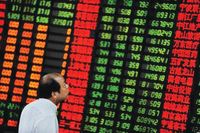In a significant development for Shanghai's industrial landscape, the city has completed the construction of four major industrial clusters, each valued at a staggering four trillion yuan. These clusters focus on key sectors including electronics, information technology, advanced materials, and biomedical services, according to a statement from Xinhua News on Wednesday, March 26, 2025.
The electronics and information technology sector in Shanghai reached a volume of 1.2 trillion yuan (approximately 167 billion US dollars) in 2024. Meanwhile, the automotive sector also showed promising growth, achieving a value of 1.1 trillion yuan last year. During this period, the city saw the issuance of approximately 280,000 local plates for new energy vehicles, highlighting the shift towards sustainable transport.
Shanghai is not only focusing on these sectors but is also actively developing other key industrial chains, including integrated circuits, biopharmaceuticals, artificial intelligence, fashion-related consumer goods, advanced materials, new energy, and low-carbon green solutions. The city is set to offer an area of 15.42 million square meters for future investment projects, with a funding allocation of 50.9 billion yuan for related industries.
Judy Marks, the CEO and President of Otis, a leading lift manufacturer, emphasized the importance of Shanghai as not just the location of Otis's headquarters in China, but also as its global research and development center. She expressed confidence in the company's growth within the Chinese market, stating, "We have full confidence in our development in the Chinese market and are committed to long-term growth here."
In contrast, the Chinese technology sector has faced significant challenges recently, particularly following a major stock sell-off by Xiaomi, which sold shares worth 5.5 billion dollars. This move has shaken investor sentiment in a market already struggling with momentum. On Tuesday, March 25, the Hang Seng Technology Index fell by 3.8%, marking a decline of over 9% since its peak on March 18.
Xiaomi's stock dropped by 6.6% during trading after the company announced an increase in its offering size. Despite the recent volatility, the earnings of Chinese technology companies have largely exceeded expectations during the latest earnings season, but sustaining this momentum has become more complex. The Hang Seng Technology Index is now approaching its three-year average, raising concerns.
Stephen Leung, Executive Director at UOB Kay Hian Hong Kong, noted that while technology companies have reported good earnings, they have not been sufficient to create "imaginative surprises" for investors. The recent sell-off was exacerbated by a warning from Alibaba Group Holding's chairman regarding a potential bubble forming in the data center construction market, which further dampened market sentiment.
Leung remarked, "The increase in the offering size by Xiaomi affected market sentiment during yesterday's session, as some fear that such an offering could pressure available liquidity in the market." This sell-off follows BYD's earlier 5.6 billion dollar offering, which, while beneficial for long-term financing, has led to immediate pressure on stock prices due to increased supply and discounted sales, according to analysts.
The decline in the Chinese market on Tuesday was contrary to the upward trend seen in other Asian markets, particularly after U.S. President Donald Trump indicated that the reciprocal tariffs expected to be imposed on specific sectors on April 2 may be less severe than anticipated. The Hang Seng China Enterprises Index also fell by over 2%.
Despite the recent downturn, the Hang Seng Technology Index remains up by 24% since the beginning of the year. Investors have been quick to reassess Chinese technology stocks since the emergence of the Deep Sea company earlier this year, with a meeting between President Xi Jinping and major business leaders accelerating stock gains.
However, any further decline in Chinese technology stocks could raise concerns among investors and undermine the growing narrative that sees Chinese markets as a potential investment alternative, especially as they reconsider the notion of American "exceptionalism." Alibaba's shares fell by over 3% after its chairman warned of potential data center bubbles, while shares of Sunny Optical Technology Group plummeted by 11% following a warning of excess production capacity.
Charu Chanana, Chief Investment Strategist at Saxo Markets, noted, "Alibaba's caution regarding a potential bubble in AI data center construction has increased pressure on the market, suggesting that the current wave of AI may face short-term hurdles."
Tsai's warning about potential data center bubbles indicated that the pace of expansion in this sector might exceed initial demand for AI services. During the HSBC Global Investment Summit in Hong Kong, Tsai highlighted the chaotic rush by major tech firms and investment funds to establish server bases from America to Asia, stating that many of these projects are being built without clear customers.
From Microsoft to SoftBank, tech companies on both sides of the Pacific are spending billions on acquiring necessary chips from Nvidia and SK Hynix to develop AI technologies. Alibaba itself, which announced in February its commitment to fully embrace AI, revealed plans to invest over 380 billion yuan (52 billion dollars) over the next three years.
As server farms proliferate from India to Malaysia, President Trump is promoting the Stargate project in America, which is expected to see investments reaching half a trillion dollars. However, many analysts on Wall Street are beginning to question the rationale behind such expenditures, especially following the launch of the Chinese startup Deep Sea, which claims to offer open-source AI that rivals American technology at a much lower cost.
Critics have pointed out the ongoing lack of real-world applications for AI technologies. Tsai expressed concern, stating, "I feel we are beginning to see the signs of a bubble of some sort," adding that some planned projects have started raising funds without securing agreements that ensure demand for their services in the future.
Despite these challenges, Alibaba is experiencing a strong resurgence in 2025, partly driven by the widespread adoption of its AI platform based on the Kevin model, which the company hopes will bolster its core businesses in trade and cloud computing services. Tsai noted that Alibaba is undergoing a "reboot" phase, having begun to recruit talent again after years of regulatory scrutiny that stifled its growth. The company has launched special programs to attract talent in AI, supporting its publicly stated ambition to explore general artificial intelligence.
Meanwhile, American companies are significantly ramping up their AI investments. Tsai sharply criticized his American competitors, particularly regarding their spending. This year alone, Amazon, Alphabet, and Meta have pledged to spend 100 billion, 75 billion, and 65 billion dollars respectively on AI infrastructure. However, in February, analysts from TD Cowen indicated that Microsoft had canceled some lease contracts for data center space in America, raising questions about whether the company had overestimated its long-term computing needs.





